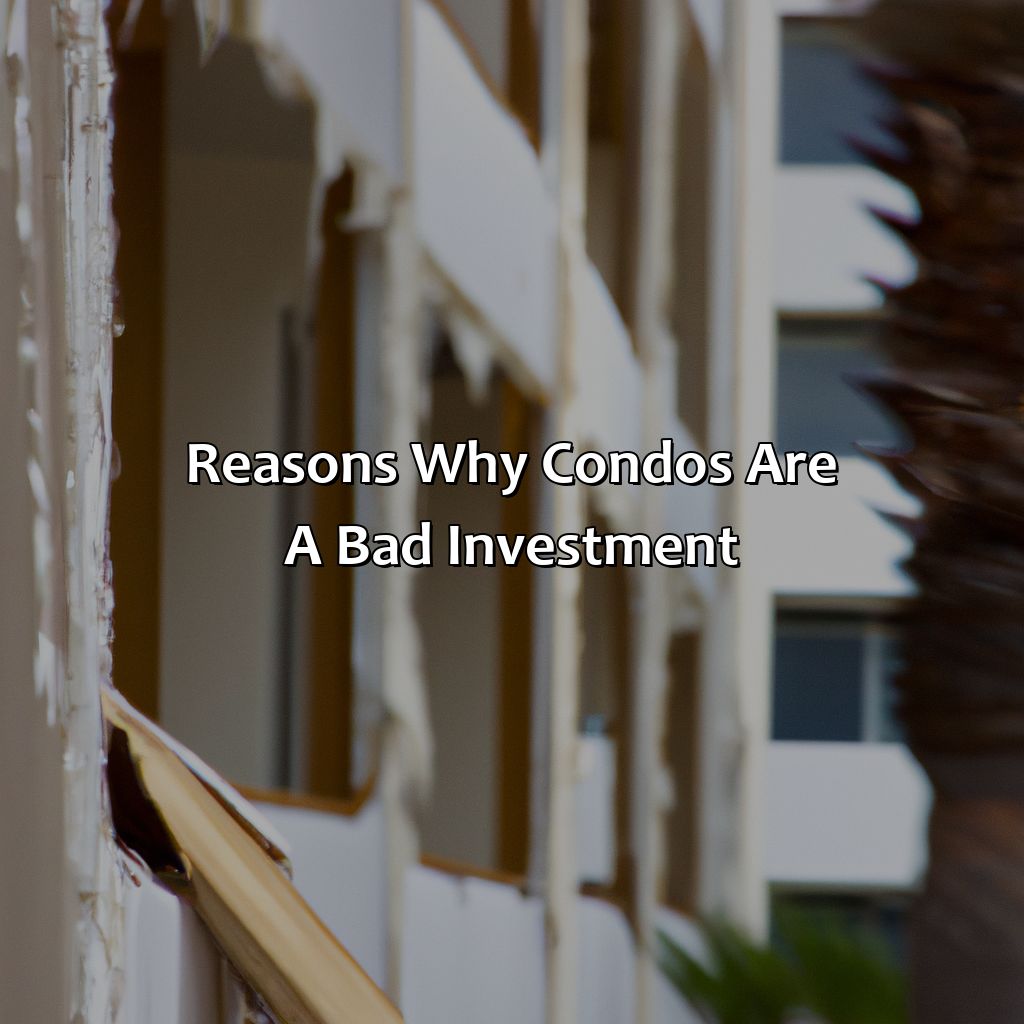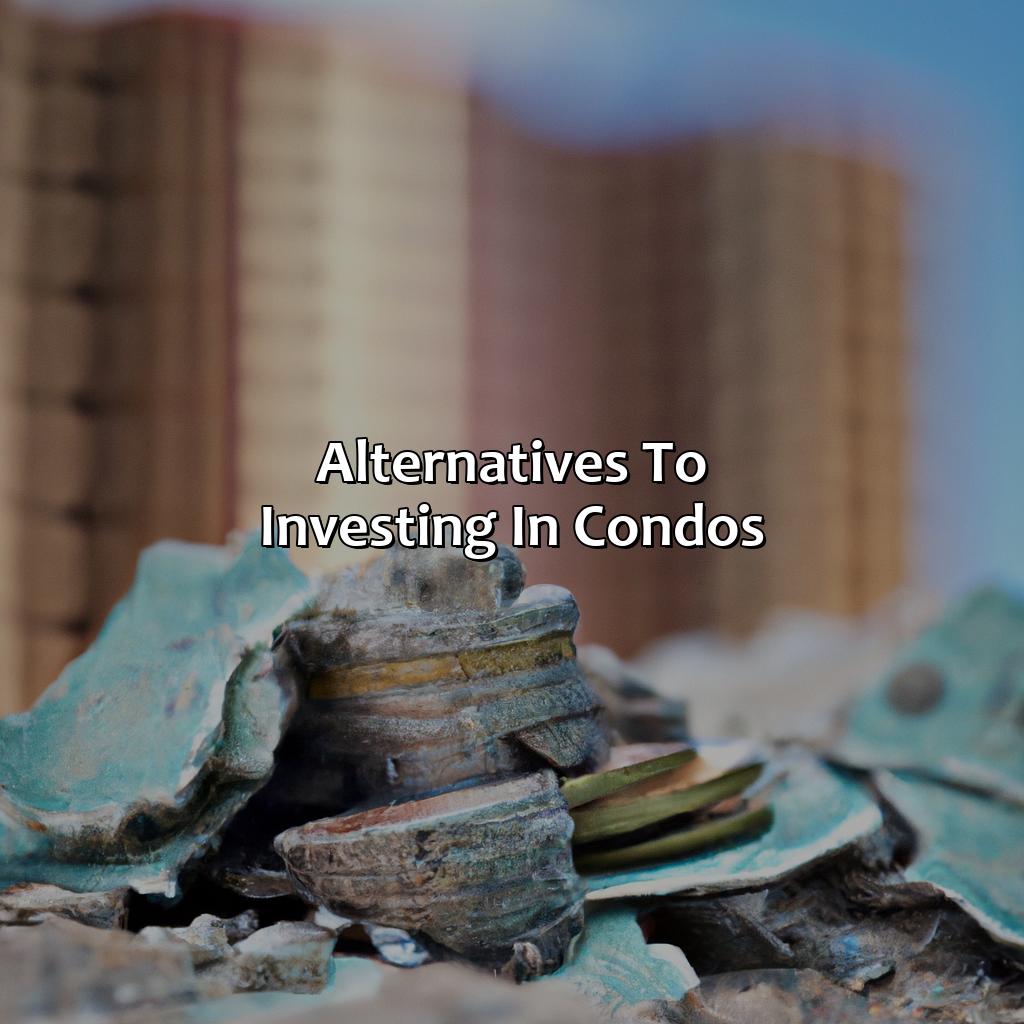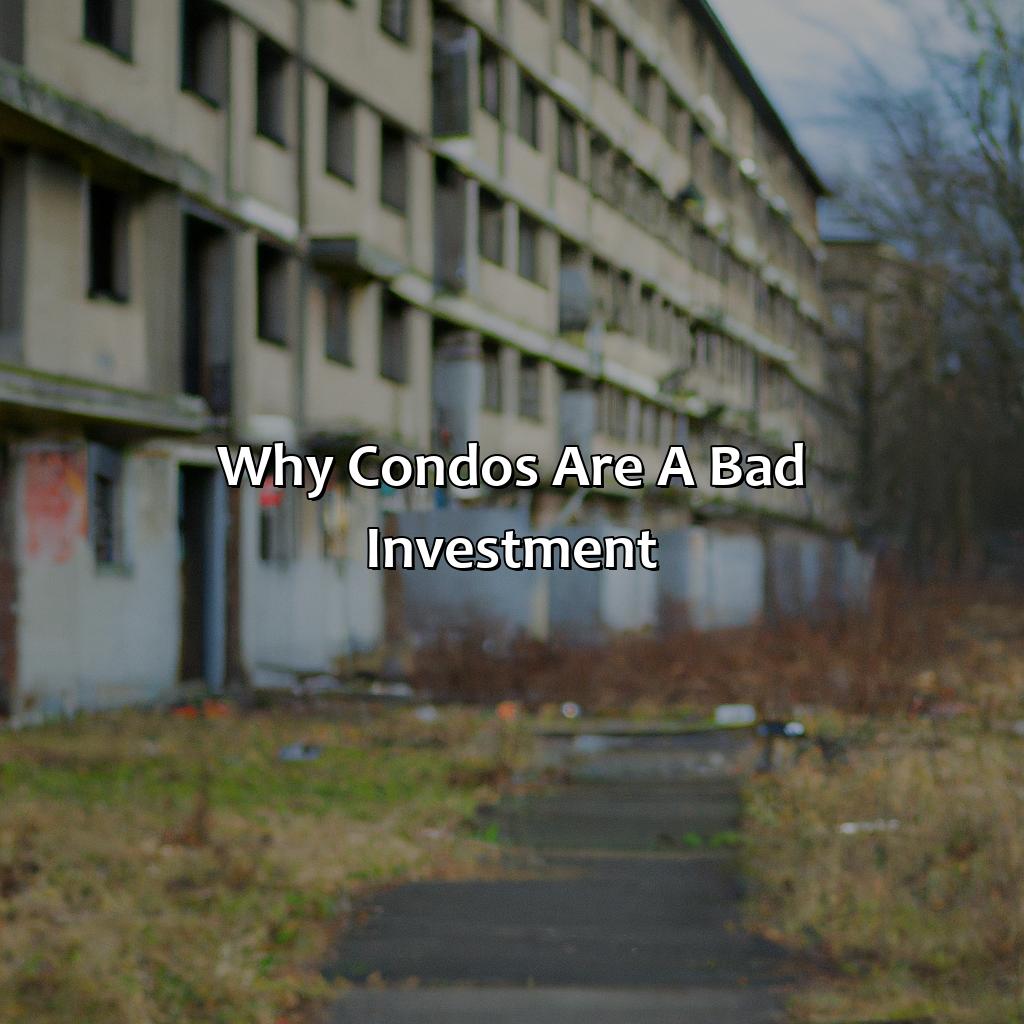Why Condos Are A Bad Investment?
Key Takeaway:
- High association fees: Condos often come with high association fees, which can eat into potential profits and make them a less attractive investment option for some buyers.
- Limited control over the building: Condo owners have limited control over the building and may not be able to make changes to the property without agreement from the association or board.
- Market fluctuations: The real estate market is subject to fluctuations, and condos may experience drops in value during market downturns or recessions.
- Lack of privacy: Condos are often built close together, with shared walls and common areas, which can result in a lack of privacy and noise pollution from neighbors.
- Difficulty in reselling: Condos can be difficult to resell, especially if there are a large number of units available in the same building or nearby area, which can reduce demand and drive down prices.
Alternatives to investing in condos:
- Single-family homes: Investing in single-family homes can provide greater control over the property and potentially higher returns, but may require more extensive property management.
- Commercial real estate: Investing in commercial real estate can offer higher potential returns and long-term leases, but comes with its own set of risks and complexities.
- Real estate investment trusts (REITs): Investing in REITs can offer exposure to the real estate market without the need for direct ownership or management of property.
Investment in condos is increasingly becoming popular, but is it a wise decision? You may have heard from people that condo investing can be risky. This blog explores why condos can be a poor financial choice, and why you should be cautious.
Reasons why condos are a bad investment
Understand why condos are bad for investments? Let’s check it out.
- Association fees too high?
- No control over the building?
- Market going up and down?
- Privacy problems?
- Difficult to sell?
These are all reasons why condos are not a great investment choice.

Image credits: retiregenz.com by David Woodhock
High association fees
The expenses related to condominiums can be significantly onerous – the costs of operation, management, and maintenance of shared amenities are all paid through association fees. These fees cover maintenance, repair, security, and other essential services for an entire community.
Considering that expense-sharing is based on a proportionate distribution per unit owner, fees may often increase suddenly due to unexpected repair charges or natural disasters. Furthermore, it can diminish property value and rental income without additional benefits—making condo ownership an unpredictable investment choice.
In addition to high association fees come renovation bills due to their necessity after some time. They encompass anything from new roofing material installation to mechanical equipment reparations such as HVAC systems replacement.
Despite the potential gains of purchasing a real estate property in a premium location with good amenities and elevators some residents have experienced disturbing events undermining any supposed advantage. One resident complained that he had bought a condominium in good faith with the idea that being gated would provide him extra security against burglars however one day he was shocked when his home was broken into.
Living in a condo is like being a tenant with a mortgage; you have limited control over the building and your investment.
Limited control over the building
As a condo owner, there is limited control over the building’s management and maintenance. The homeowners’ association (HOA) of the building is responsible for making decisions about common areas and often imposes rules regarding individual unit upkeep.
Moreover, HOAs have authority over modifications to the property and can restrict different aspects such as pet ownership or parking. They also dictate how much owners need to contribute towards emergency repairs or upgrades, making it hard to forecast expenses.
What’s more, limited control means less flexibility in deciding how to manage problems like noise complaints or security concerns. Thus, comprehensive research on HOA management history and rules is necessary before buying a condo in any building.
Many years ago, my friend bought a condo only to realize that his HOA had adopted policies which favored certain residents by eliminating street parking for anyone not owning a garage. This ruling resulted in chaos because some people needed spaces for visitors, service personnel or emergency-related needs but couldn’t park inside their homes. Eventually, many residents left the building leading to an increase in board dues for those who stayed.
Buying a condo is like jumping on a trampoline during an earthquake – you never know when the market will bounce back up or crumble beneath you.
Market fluctuations
Investing in condos may not be a wise decision due to unpredictable changes in the real estate market. The fluctuations in value can cause significant financial loss to the investor. The variance is brought about by factors such as interest rates, the economy, and buyer or seller needs.
Besides, external factors play a massive role in condo values too. Market demands are continually evolving, and shifts in demographics have made it harder for condos to maintain their expected value. Even adding extra features to a unit won’t guarantee its appreciation.
In addition, many investors purchase condos as short-term investment opportunities without considering future sale prospects. Since they believe that renting out the unit will generate high returns on monthly income without assessing long-term rental demand, they often suffer losses.
In the past decade, there were significant instances of market fluctuations that resulted in substantial depreciation of condo values nationwide. For example, during the 2006-08 crisis, the US property market saw sharp declines in prices and increased home foreclosures. Hence owning one should be considered cautiously by individuals who prefer lowering their overall risk exposure over seeking profit potential as it’s never guaranteed.
Lacking privacy in a condo is like trying to hide from a horror movie killer in a glass box.
Lack of privacy
Living in condos can raise significant concerns regarding privacy. Residents are often too close to their neighbors, and this can lead to a lack of privacy. The close proximity means that any unnecessary noise or disturbances in the adjacent units can quickly become a source of annoyance for residents.
Additionally, living in a shared building means that people have to share common areas such as lobbies, elevators, and corridors. This could result in frequent encounters with strangers or unwanted visitors.
Furthermore, condo ownership typically includes the payment of Home Owner Association (HOA) fees. While these fees contribute towards maintaining the property’s common areas and amenities, they also give the HOA board some control over certain aspects of owners’ lives, such as who stays in units and how units are decorated.
It’s important to note that not all condos have this issue. Some buildings come with thicker walls and efficient soundproof measures to provide residents with more privacy. However, it is still essential to do thorough research before purchasing.
Overall, condos may not be suitable for those looking for solitude and an increased level of privacy in their living arrangements. Additionally, unexpected changes within an HOA board can impact residents’ lifestyles, leading them to feel like they have less control over their own space.
Reselling a condo is like trying to sell a used toothbrush- nobody wants it and it’s hard to convince them otherwise.
Difficulty in reselling
Reselling a condo could become quite arduous and time-consuming. Often, the real estate market has several similar units for sale, causing buyers to have many choices. Additionally, condos usually pay high association fees, which could deter many potential buyers. Therefore, selling may take an extended period and come with additional expenses such as marketing costs and legal fees.
Furthermore, when it is time to sell the unit, there are many factors that might influence the final selling price. For instance, if there are deficiencies in the building’s infrastructure or maintenance issues with the condo unit itself, buyers could be turned off by these drawbacks.
Moreover, reselling a condo also involves adhering to specific legal procedures and regulations. The buyer must go through the pre-approval process as well as meet other qualifications before closing on a deal. This formal procedure may involve paperwork and inspections by financial institutions and condominium associations.
Pro Tip: Conduct thorough research of your local real estate market before putting your condo up for sale; this could give you estimates on pricing trends and help you set a reasonable asking price to attract potential buyers.
Looking for a better investment than a condo? Consider buying a cardboard box and living under a bridge instead.
Alternatives to investing in condos
Considering investing in condos? There are other options! Sub-sections of single-family homes, commercial real estate and real estate investment trusts (REITs) are all alternatives. Condos come with drawbacks. We’ll give you info on these other options so you can diversify your real estate investments.

Image credits: retiregenz.com by Yuval Duncun
Single-family homes
Properties with single occupancy are the go-to option for long-term investments. Single-occupancy abodes give more privacy, utility and amenity. They also provide more legroom and can be personalized to a greater extent, while providing a better resale value. The method of purchasing these homes has been simplified in recent years, making it easy for investors to find the perfect property.
Single-family properties are superior due to their numerous benefits such as security and a greater sense of community. The design patterns of these houses provide an excellent layout for an extensive family or group of people. Another significant advantage is that you get more room for outside activities such as gardening and recreational games. Investing in physically detached residences is much more lucrative than investing in confined spaces such as condos.
Investing in individual properties ensures more independence and eliminates dictates by management committees when making decisions about the property’s management and maintenance. You may also lease your single-family residency based on your clauses with the tenant giving you more control over your initial investment.
In a study conducted by Forbes, research indicated that investment made into single-family homes witnessed a rise from $16 billion to $23 billion between 2018-2020, reflecting its growing popularity among young investors expressing their interest in greater long-term security investments.
As we analyze why condos make bad investments, we note the high cost fluctuation which puts them at risk regarding long-term valuations; they operate under inflexible homeowner associations (HOA’s) which often influence tenant restrictions limiting profit-oriented opportunities while negating personalization options completely. Furthermore, many HOA’s drive potential tenants away with overly restrictive clauses often deemed unnecessary or arbitrary by condo procurers hurting saleability factors frequently resulting in high renter turnover rates and devaluation of investment interests altogether.
Avoiding condos and investing in commercial real estate is like choosing a hot fudge sundae over a melting frozen yogurt.
Commercial real estate
Investing in non-residential properties can be a wise investment opportunity for those seeking to diversify their portfolio. Non-residential real estate, such as office buildings, retail spaces and warehouses fall under the category of Commercial Real Estate (CRE). This form of investment has potential for long-term gains with passive income from rent.
While investing in condos may seem like a profitable option, there are plenty of downsides. For starters, condo fees can be high and unpredictable, making it difficult to forecast expenses. Additionally, condo values often appreciate at a slower rate compared to other forms of CRE. There is also less control over rental units with condo investments as condo boards may regulate how the property is used.
Despite risks associated with all forms of real estate investments, CRE offers unique advantages including potential for regular cash flows from rent and opportunities for capital gains through appreciation. It’s an exciting time to consider investing in property markets that have emerging technologies such as smart buildings that could offer advantages over traditional commercial rentals.
Don’t miss out on the wealth-building potential that CRE can offer investors who seek diversity in their portfolios beyond condos. Let’s explore further information surrounding the trends of commercial real estate market movements before acknowledging your next move!
Get all the benefits of investing in real estate without the hassle of dealing with pesky tenants and leaky roofs through REITs. Plus, it’s the only way to legally call yourself a real estate tycoon without Donald Trump levels of wealth.
Real estate investment trusts (REITs)
Real estate investment trusts operate like a stock and invest in real estate properties. These investments are traded on the stock exchange, providing investors with an opportunity to hold a share in a portfolio of income-producing properties. Unlike traditional property ownership, REITs offer liquidity, cheaper entry points, and cash dividends. With diversified exposure to different sub-sectors of real estate like commercial, residential, healthcare or logistics, they provide a lucrative option for passive income seekers.
Investing in REITs can facilitate investors to capitalize on the real estate market while avoiding the complexities of direct property ownership like property management stresses or acquisition financing costs. Instead of buying individual properties, an investor can entrust their investment with a trustworthy manager who has deep knowledge and acumen about the sub-market and decisions. This allows the investor to grow their investment more passively while justifying some fee payments to the fund managers.
Notably, regulatory mandates stipulate that REITs should pay at least 90% of their taxable income via distributions like dividend payments among investors annually making it attractive for passive income generation. Also permitting quicker entries into bigger portfolios that may otherwise have taken years if made by single asset acquisitions.
Backed by well-vetted underwriting procedures and experienced management teams ensures that shareholders get seamless operations and maintained structures with less risk.
For instance, in 2016 activist shareholder Marcato Capital Management LLC pushed Buffalo Wild Wings management towards divesting from its branches towards focusing on franchising. The chain restaurants gladly obliged as they released value through this step without expanding one bit which benefited both the company worker’s stakeholders alike.
Five Facts About Why Condos Are a Bad Investment:
- ✅ Condos often come with high monthly fees and assessments that can eat into any potential profit. (Source: Investopedia)
- ✅ Condos typically appreciate at a slower rate than single-family homes. (Source: The Balance)
- ✅ Condos may be difficult to resell in a slow market, leaving owners stuck with their investment. (Source: Money Crashers)
- ✅ Owners of condos have less control over the building and may be subject to association rules and regulations. (Source: The Motley Fool)
- ✅ With so many condos being built, the market may become oversaturated, driving down prices. (Source: Forbes)
FAQs about Why Condos Are A Bad Investment?
Why condos are a bad investment?
Condos are a bad investment for several reasons, including the following:
Do condos appreciate in value?
While condos can appreciate in value, the appreciation tends to be lower than that of single-family homes. Additionally, condos are more susceptible to market downturns, which can decrease their value.
What are the disadvantages of buying a condo?
The disadvantages of buying a condo include higher HOA fees, lack of privacy, limited control over shared spaces, and potentially stricter rules and regulations.
Are condos a good investment for rental purposes?
Condos can be a good investment for rental purposes, but they come with their own set of challenges. For example, HOA restrictions may limit your ability to rent the unit, and rental income may not cover the cost of HOA fees and other expenses.
What are some additional costs associated with owning a condo?
Additional costs of owning a condo may include special assessments, maintenance fees, and repair costs for shared spaces. You may also be required to pay for amenities that you do not use.
What should I consider before buying a condo?
Before buying a condo, you should consider the location, the HOA regulations, the financial stability of the HOA, and the potential long-term costs associated with ownership. You should also be prepared to compromise on privacy and control over shared spaces.
